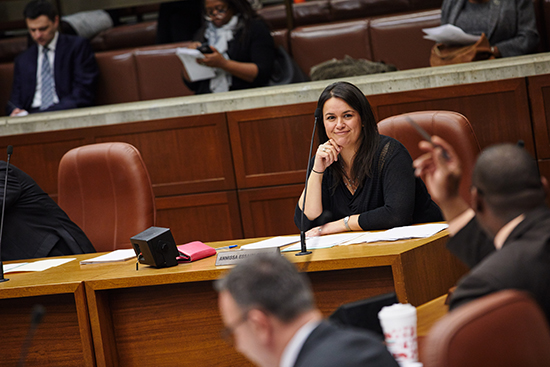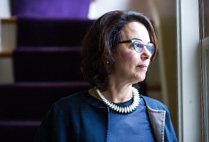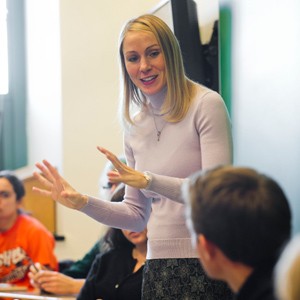In April 2013, Boston Globe columnist Yvonne Abraham posed a rhetorical question to the city: why aren’t there more women in local politics?
As the race for an open mayoral seat warmed up, she noted that the emerging field had eight candidates, and none was a woman. “I hope this seems weird to you. It sure does to me,” wrote Abraham (COM’94). “If no woman puts her hand up at the municipal level, what hope do we have of redressing the crazy lopsidedness in the rest of the political system?”
Annissa Essaibi-George (CAS’96) had contemplated running for a seat on the Boston City Council. Abraham’s column hardened her determination. While she did not win that year (she came in fifth in an eight-candidate field vying for four at-large seats), the campaign set her up for a successful bid two years later. Today, she is one of four women on the 13-member city council, tying a record for the number of female councilors.
Essaibi-George had long been interested in politics. “I think that’s part of being born and raised in Boston,” she says. “It’s such a hyperpolitical town and hyperpolitical environment.”
But one note of discouragement, ironically, came from her father, Ezzeddine Essaibi, a Muslim who doubted that a woman with an Arabic name could ever make a career in Boston politics. “That wasn’t the Boston that he experienced,” she says. “He told me at a really young age that he didn’t think it could happen for me, and I should perhaps explore different dreams.”
She did pursue other interests, but she never gave up her first aspiration. In high school, she got involved in student government and spoke out at a City Hall Plaza rally protesting school budget cuts proposed by Ray Flynn, then mayor of Boston.
At BU, she studied political science and had an internship in the office of US Senator Max Baucus (D-Mont.) in Washington, DC. When she graduated, she worked at the Boston Private Industry Council, connecting students with local workplace opportunities. After earning a master’s degree in education from the University of Massachusetts-Boston, she taught social studies electives, including courses in economics, financial literacy, health careers, and entrepreneurship, at East Boston High School from 2001 to 2014.
Speaking Out
Essaibi-George’s parents met as college students studying in Paris. Barbara, born of Polish parents in a displaced persons camp in Germany, grew up in Boston. Ezzeddine, who died in 2010, was from Tunisia. Their romance led him to immigrate to the United States in 1972. They settled in Barbara’s Dorchester neighborhood and raised four kids.
When Essaibi-George was in high school, her father took a job as a security guard at BU, mindful of the University’s employee tuition remission program, which offers free or greatly reduced tuition to children of employees. She says she lived off campus so she wouldn’t run into her father every day where he worked, mostly on West Campus.
She and her siblings grew up in an interfaith family—they were raised Catholic, while their father was a practicing Muslim. She says she learned to overcome her father’s wariness about her interest in politics and elective office.
Essaibi-George attended Boston Technical High School (now the John D. O’Bryant School of Mathematics and Science). Robert Bell, an assistant headmaster there, recalls early indications that she was a leader and says she frequently lobbied for social action. “Whenever there was something right or wrong,” he says, “she championed it and campaigned for it. Annissa was always there.”

Essaibi-George’s agenda is informed by her years as a teacher. As a city councilor, she voted against her first school budget because it lacked funding for enough librarians, reading specialists, and counseling services for students with autism and other special needs.
When her school moved to a Roxbury campus shared with three other high schools, Essaibi-George became an advocate for her peers, rallying students to attend meetings with administrators, arguing for changes in the school’s security and scheduling to make the move less disruptive for Boston Technical students.
“She was very vocal. She stood out,” says Bell, who has volunteered on Essaibi-George’s city council campaigns. “You couldn’t say no to Annissa. I would say, ‘We’re going to do this,’ in response to her. And she would come back and say, ‘OK, how soon will you do it? When will we know? How will we know?’ And what she said always had some merit to it.”
Essaibi-George is still speaking out—against school budget cuts and for greater support of homeless families with children, among other issues.
Teacher, Parent, Product of Boston Schools
It’s a Monday, and it’s Essaibi-George’s turn to drive her four boys—she and her husband, real estate developer Doug George (ENG’90), have an 11-year-old and 9-year-old triplets—to the Oliver Perry School in South Boston.
Then there are meetings. First, to discuss strategy for the upcoming campaign with her political consultant. Next it’s over to Dorchester’s Polish Triangle neighborhood to Stitch House, a store she founded in 2007 that sells yarn and fabrics and offers classes in sewing and knitting (other days she relies on her five employees to keep things going). After that, she heads to the Back Bay for a tour of Room to Grow, a local nonprofit that supports babies born to low-income parents. Then it’s off to City Hall.
Every appointment has a purpose. Essaibi-George accepted the nonprofit’s invitation to visit because of her position as chair of the council’s new committee on homelessness, mental health, and recovery.
“If there’s ever an opportunity for future collaboration, just knowing the players in the city and the organizations that do great work is important,” Essaibi-George says. “In general, I’ve spent this last year with my goal: I want to know everything I can about everything that’s happening in the city.”
Her agenda is informed by her years as a teacher. As a city councilor, she voted against her first school budget because it lacked funding for enough librarians, reading specialists, and counseling services for students with autism and other special needs. She advocated for housing and transportation for the children of homeless families facing eviction from state-funded hotel rooms so they would be ready for the start of the school year. And she hopes a pilot program she supported instituting later start times for high school students will launch in the fall.
“Education will always be at the top of my list,” Essaibi-George says. “I’m a teacher. I’ve had that very real experience. That’s one reason the voters picked me—my intimate knowledge of education as a teacher and as a parent, and as a product of the Boston public schools.”
She’s interested in other issues, too. She has called for public hearings to explore ways to support small businesses that can’t afford the city’s rising housing costs and to address the proliferation of Canada goose droppings in Boston’s public parks.
While politics is about working with people who have different views, she has found a natural ally in fellow first-term city councilor Andrea Campbell. The pair met on the campaign trail and have become friends, sharing tips on getting accustomed to their new roles.
Campbell says Essaibi-George’s efforts to launch the committee, by holding hearings at sites like the St. Mary’s Center for Women and Children shelter in Dorchester, are “about providing a stage for women in the shelter to share their stories, their frustrations, and their successes, so we can take these thoughts back to City Hall to inform policy.
“This is the first time you have a committee talking about mental health and homelessness. These are issues extremely important not only to Boston, but to the state, and Annissa immediately jumped all over it. She is intentional in making sure it’s a collaborative process. That is a great example of how she is compassionate and empathetic in her work.”
To Essaibi-George, having the opportunity to do the work she’s doing as a city councilor is “incredible.”
“People think I’m crazy when I say I love my work,” she says. “I love every day.”

















































A woman should be able to work in the political world not only men, women also have an important role in it. Very good, it is time for female teachers to participate in politics